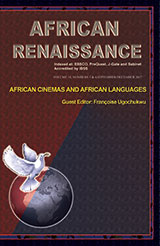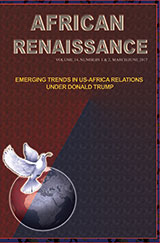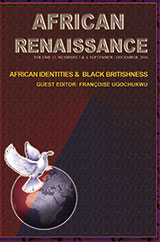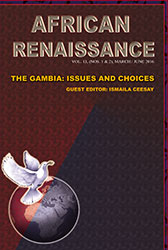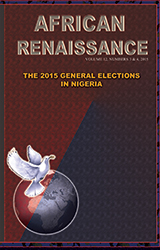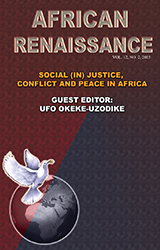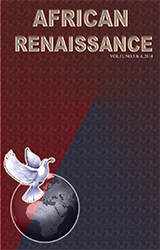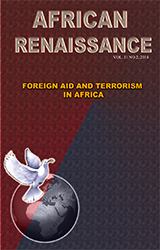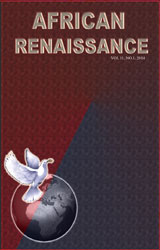
 editor@adonis-abbey.com
editor@adonis-abbey.com ![]() UK: 0207 795 8187 / Nigeria:+234 705 807 8841
UK: 0207 795 8187 / Nigeria:+234 705 807 8841

Publication Frequency: Quarterly (Four times a year) (ISSN 1744-2532 E- ISSN 2516-5305). SCImago Journal Ranking for 2024: Quartile: Q3; SJR: 0.165
View Table of Content
African Renaissance Vol. 14, (Nos. 3 & 4), Sept/Dec 2017 African cinemas and African languages Guest Editor: Françoise Ugochukwu
The present issue of African Renaissance focuses on the choice of language in African filmmaking, an issue which first came to light in 1968 when for the first time the Senegalese writer and filmmaker Sembene Ousmane decided to use Wolof as the main language of expression in Manda bi. Long hidden from view as Western research and publications chose to focus on films in colonial languages (mainly French or English), this issue has gradually emerged as central as filmmakers gradually ventured into so-called ‘vernacular’ productions, with Nigerian films questioning previous choices and addressing the need for films to speak first to their local and regional audiences. Articles gathered here and covering various parts of the continent reveal an explosion of films in various languages - Wolof, Moore, Dioula, Yoruba, Igbo, Edo, Sotho and others – emerging from the shadows, breaking age-long language barriers and making their way into success. They analyse an array of movies...
View Table of Content
African Renaissance Volume 12, Numbers 3 & 4, 2015
The 2015 presidential election in Nigeria was like no other in the history of presidential politics in the country. For the first time in the country’s political history, a number of opposition parties merged in a bid to provide a competitive challenge to the ruling party, the Peoples Democratic Party (PDP). Hitherto, opposition political parties had been adept at talking tough and grandstanding about a mega party, which often came to nought. Surprisingly in the run up to the 2015 elections some regional-based political parties surmounted obstacles and against all expectations consummated a merger that gave birth to the All Progressives Congress (APC). The parties that merged to give birth to APC were the Action Congress of Nigeria (A.C.N.), which was dominant in the South-west part of the country and was led by former Governor of Lagos State Ahmed Bola Tinubu, the Congress for Progressive Change (CPC), which was formed by former military dictator Muhammadu Buhari in ...
View Table of Content
African Renaissance Volume 12, Number 2, 2015: Social (In) justice, Conflict and Peace in Africa
The phenomenal growth of the global political economy over the past fifty or so years has been matched not only by widening gaps in income between individual states and between individual citizens, but also the monumental increases in the number of people that the earth’s depreciating and dwindling resources can feed or support comfortably. Beyond the resulting tensions, further irritations have emerged and coalesced over the years around the apparently embedded global divisions of labor (and the associated rewards) as well as the socio-economic and cultural effects and, particularly, power it imbues (or denies) to particular social groups or parts of the world. The net effect is that the contemporary global system remains beleaguered by a hodgepodge of issues and grievances. In consequence, tensions and conflicts have become rife around not only religion, ethnicity/race, but also the so-called “new” security challenges to human wellbeing such as health pandemics...
View Table of Content
African Renaissance Volume 11, Numbers 3 & 4, 2014
When Obama became the first Black President of USA, African leaders and citizens had great expectations that one of their own had finally come to occupy the most powerful position in the world – as president of the United States of America. Because Obama’s father was Kenyan, there were expectations that he would give Africa and its challenges a prominent position in his foreign policy options. In fact shortly before the 2008 election, a Senior Obama Africa adviser articulated what he said would be Obama’s policy for Africa if he won the elections. These included accelerating Africa’s integration into the global economy; enhancing regional peace and security; deepening democracy and accountability as well as reducing poverty (Schaefer, Floranceand Kim, 2014). Largely because the promises were generic and couched in altruistic terms, they were not objectionable even to Obama’s opponents....
View Table of Content
African Renaissance Volume 11, Number 2, 2014, FOREIGN AID AND TERRORISM IN AFRICA
One of the questions that fascinated policymakers and academics following the terrorist attacks in the USA on September 11 2001 was whether foreign aid could be used to stop terrorism ( see for instance Azam and Thelen, 2010; Sharma, Davis and Findley, (2009); Savun and Hays (2011). For those who believe it can, often the ideological or philosophical basis of their position was a certain belief that the frustrations of supposedly unhappy people in poor countries predispose them to terrorism. This in turn led to conclusions by some Americans that increasing the country’s “wavering commitment to foreign aid” could at least be part of the solution (Graham, 2012). In fact, Lindsay, Greenberg and Daalder (2002) had shortly after the September 11 terrorist attacks in the USA argued:...
To subscribe to any of the journals, Please Email Us.




